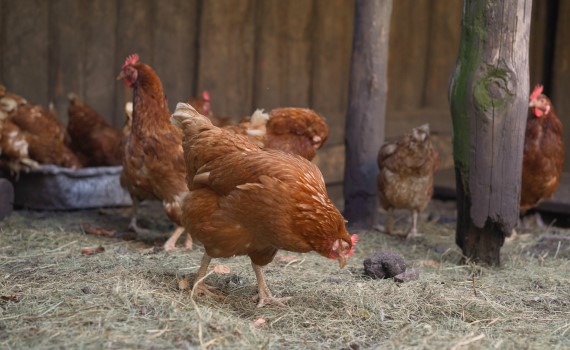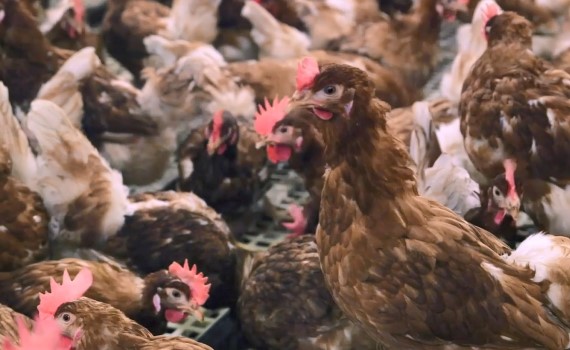IBD control in egg layers has unique challenges

By Daral J. Jackwood, PhD
Professor
The Ohio State University
Controlling infectious bursal disease (IBD) in poultry is always challenging, but it’s especially so in layer pullets.
IBD virus infects immature B cells, which originate in the bursa of Fabricius. B cells produce antibodies and are an important part of the immune system. The pathogenicity of IBD virus strains in pullets is in general greater than what is typically seen in broilers. Not only are morbidity and mortality higher, but damage to the bursa and resulting immune suppression are more severe in pullets compared to broilers.
Young chicks need to be protected from the IBD virus by maternal immunity. Without sufficient maternal immunity, life-long immune system suppression will occur, leaving birds vulnerable to opportunistic microorganisms that can cause disease and result in poor flock performance.
Older birds at risk
Although we think of IBD as a disease of young birds, the IBD virus can also infect older pullets. The initial very virulent (vv)IBD virus outbreaks in the US were in 9-week-old pullets, while in Europe there are reports of vvIBD virus infecting pullets as old as 15 to 18 weeks of age.
IBD in older birds usually does not cause permanent immune system suppression, but the disease can last a week or more, compromising the pullet’s immune system. Here again, birds are vulnerable to infections by opportunistic microorganisms that can exacerbate morbidity and mortality and increase the cost of producing a high-quality layer flock.
Appropriate vaccines
In young pullets, maternal immunity is accomplished by using appropriate IBD vaccines in breeder flocks. By appropriate, I mean the vaccines used in breeder birds need to closely match the antigenicity of the IBD virus strains causing disease on pullet farms. This can be challenging because the antigenicity of the IBD virus is constantly changing through the evolutionary process of antigenic drift.
To guard against IBD in older pullets, egg producers need to make sure an appropriate vaccination program produces sustained active immunity against IBD virus. This is in contrast to IBD protection in broilers, where producers can get away with maternal immunity and short-term active immunity to IBD virus.
In pullet chicks, maternal antibody titers can be monitored using commercial IBD ELISA kits. In general, you would expect that high antibody titers would protect against IBD virus infections, but this isn’t always the case. Although there is some cross-protection between IBD virus strains, especially when maternal antibody titers are high, outbreaks of IBD frequently occur in chicks with anti-IBD virus ELISA titers that would be considered protective. This occurs because of the antigenic changes that occur as these viruses evolve over time.
Identify IBD virus strains
Providing maternal immunity that protects against the field strains of IBD virus in pullets is challenging for egg producers since most of them do not own breeder flocks, and they do not have control over the vaccines being used in breeders.
Egg producers can, however, use molecular diagnostics to identify the IBD virus strains causing problems in their pullet flocks — but then they must convince breed-flock owners to use the appropriate IBD vaccines.
The sequence of the IBD virus VP2 protein is used to identify the antigenicity of IBD virus strains and determine the most appropriate vaccine — or vaccines — for the flock.
In addition to determining the antigenic strain causing the problem, regular monitoring of the flock using molecular diagnostics can pinpoint when the virus is breaking through maternal immunity. This is important because it is an indication of how well the breeder vaccination program is working.
‘Critically’ important
I cannot stress enough that early infections can produce permanent, life-long immune suppression. Blocking early infections with maternal immunity is critically important for controlling IBD in pullets if they are to have an immune system strong enough to sustain them through the egg-laying period.
When maternal immunity wanes, it’s equally important to have a vaccination strategy that stimulates a protective, active immune response by using immune complex or recombinant IBD vaccines in ovo and/or live-attenuated IBD vaccines.
Egg producers need to work closely with breeder-flock owners to ensure the pullets placed on their farm are adequately protected from the strains of IBD virus in the environment. Regular monitoring of the birds using molecular diagnostics will give egg producers the data they need to determine the best vaccination program not only for breeders, but for their pullets.
Posted on September 20, 2021
 We’re glad you’re enjoying
We’re glad you’re enjoying














